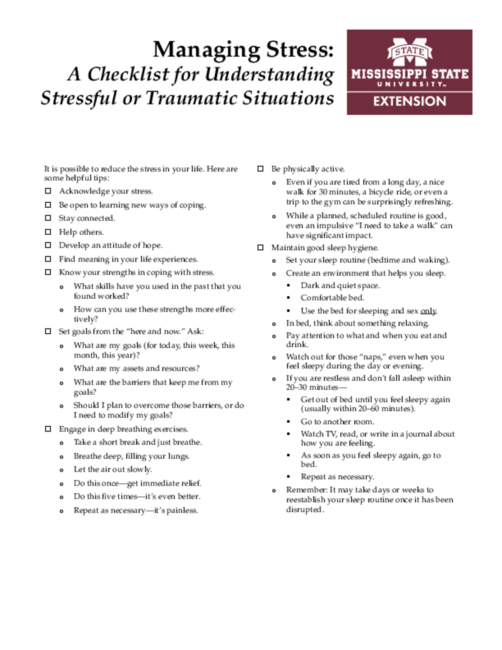IS2005
Managing Stress: A Checklist for Understanding Stressful or Traumatic Situations

It is possible to reduce the stress in your life. Here are some helpful tips:
- Acknowledge your stress.
- Be open to learning new ways of coping.
- Stay connected.
- Help others.
- Develop an attitude of hope.
- Find meaning in your life experiences.
- Know your strengths in coping with stress.
- What skills have you used in the past that you found worked?
- How can you use these strengths more effectively?
- Set goals from the “here and now.” Ask:
- What are my goals (for today, this week, this month, this year)?
- What are my assets and resources?
- What are the barriers that keep me from my goals?
- Should I plan to overcome those barriers, or do I need o tmodify my goals?
- Engage in deep breathing exercises.
- Take a short break and just breathe.
- Breathe deep, filling your lungs.
- Let the air out slowly.
- Do this once—get immediate relief.
- Do this five times—it’s even better.
- Repeat as necessary—it’s painless.
- Be physically active.
- Even if you are tired from a long day, a nice walk for 30 minutes, a bicycle ride, or even a trip to the gym can be surprisingly refreshing.
- While a planned, scheduled routine is good, even an impulsive “I need to take a walk” can have significant impact.
- Maintain good sleep hygiene.
- Set your sleep routine (bedtime and waking).
- Create an environment that helps you sleep.
- Dark and quiet space.
- Comfortable bed.
- Use the bed for sleeping and sex only.
- In bed, think about something relaxing.
- Pay attention to what and when you eat and drink.
- Watch out for those “naps,” even when you feel sleepy during the day or evening.
- If you are restless and don’t fall asleep within 20–30 minutes—
- Get out of bed until you feel sleepy again (usually within 20–60 minutes).
- Go to another room.
- Watch TV, read, or write in a journal about how you are feeling.
- As soon as you feel sleepy again, go to bed.
- Repeat as necessary.
- Remember: It may take days or weeks to reestablish your sleep routine once it has been disrupted.
- Eat a healthy diet.
- Good nutritional balance will help you cope.
- Eat regular meals and controlled amounts at regular times.
- Watch out for snacks and for eating later in the evening (can impact sleep).
Managing Stress Requires Action Now and a Commitment for the Future
- Skills help most when used routinely (but it can be hard to remember to use the skills).
- Practicing will help you get better at managing stress.
- Practicing bad behaviors will cause you to get better at them, too, so avoid them!
- If you deliberately practice positive skills, you are more likely to remember you have those tools in your toolbox.
Never be ashamed to seek professional help from a licensed counselor, therapist, or psychologist; he or she may be able to help you build or improve on these life skills.
National and State Resources
National Crisis Hotline
1-800-273-TALK (8255)
Mississippi State Health Department
1-866-HLTHY4U (458-4948)
2-1-1 Mississippi Community Resources
Dial 211 from your phone or 866-472-8265
Local Resources
For more information on stress and trauma, see Extension Information Sheet 2004 Managing Stress: A Guide for Understanding Stressful or Traumatic Situations.
Developed in collaboration with

The Mississippi State University Extension Service is working to ensure all web content is accessible to all users. If you need assistance accessing any of our content, please email the webteam or call 662-325-2262.
